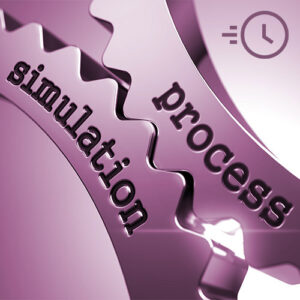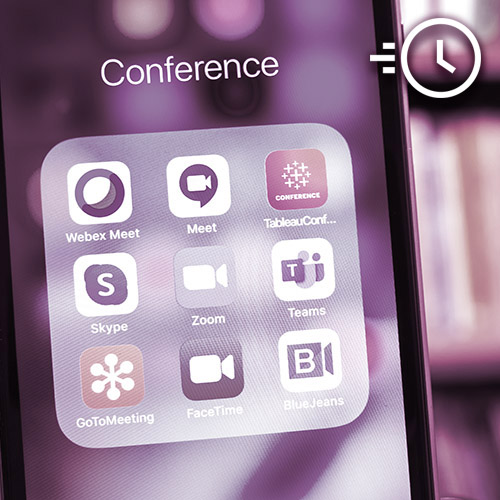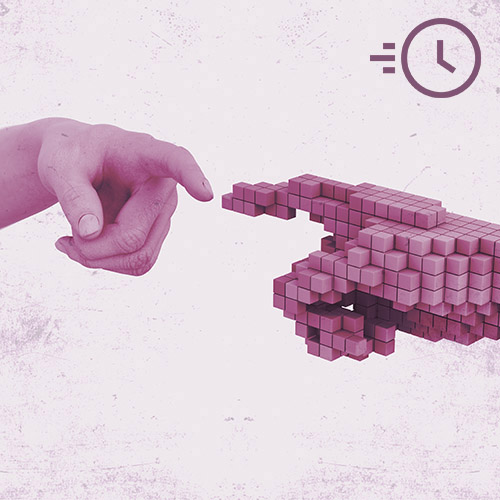Our online micro-course series provides accessible, affordable, just-in-time learning for the new normal in simulation. They may be taken individually or as a complementary package. NOW available asynchronously!
With clinical placement opportunities limited by the pandemic, many schools are emphasizing simulation opportunities for learners to gain essential skills and experiences. Accordingly, educators are adapting their roles – some entering simulation for the first time and others shifting to deliver distance simulations by webconference or to develop virtual simulations / virtual patients.
All courses comprise 4-6 contact hours with leading simulation experts to provide the absolute essential principles and practical techniques for educators from any healthcare or human service field.
Courses are $150 each or take 3 courses for $425 + HST (save $25!) or all 4 for $500 + HST (save $100!). Individual members and employees of our member organizations save an additional 10%.
Micro-Course: Practical Fundamentals

Just in time, this 4-hour online micro-course will focus on the essential and practical foundations of simulation for educators undertaking simulation-based teaching. During two recorded online lectures, we will engage attendees in topics related to fundamentals of healthcare simulation. This course will include a review of key concepts and educational theories, and approach to planning and preparing for your simulations.
With clinical placement opportunities limited by the pandemic, many schools are emphasizing simulation opportunities for learners to gain essential skills and experiences. For educators who have limited prior experience or training in simulation-based education, this course provides an overview of simulation approaches, options, and techniques, and their pedagogical foundations.
Learning Goals
By the end of this program, participants will be able to:
- Describe the educational theories, models and concepts that underpin simulation-based health
professions education. - Select the modality that would be the most appropriate choice for the simulation scenario being planned.
- Plan and troubleshoot simulation activities.
Modules
Module 1: Key Concepts of Simulation
2 hours recorded lecture session + online learning resources
Facilitator: Amy Nakajima, MD FRCSC
Goals:
- Review key concepts and simulation phases.
- Discuss participant safety.
- Discuss planning and implementation of simulation activities.
Module 2: Planning and Preparing for Your Simulation
2 hours recorded lecture session + online learning resources
Facilitator: Amy Nakajima, MD FRCSC
Goals:
- Review activities included in the preparation phase.
- Review how to design a simulation.
- Discuss approaches to minimize the occurrence of unexpected events and how to manage them.
Course Completion
Upon completion of this MicroCourse, participants will receive:
- e-certificate of completion
Micro-Course: Briefing & Debriefing

This 4-hour online micro-course will enable you to develop a practical understanding of skills and concepts related to briefing and debriefing – a crucial component to all simulation and experiential learning. During two recorded online lectures we will engage in topics related to the process of effective briefing and debriefing, key phases, and situational variables which influence the choice of approach of debriefing.
With clinical placement opportunities limited by the pandemic, many schools are emphasizing simulation opportunities for learners to gain essential skills and experiences. For educators who have limited prior experience or training in simulation-based education, this course provides a quick, practical introduction to briefing and debriefing for effective learning in simulation.
Learning Goals
By the end of this program, participants will be able to:
- Discuss the concepts of feedback and debriefing.
- Describe key phases of debriefing.
- Describe various approaches and strategies that can be utilized in the analysis phase.
- Review how to select an appropriate analysis phase approach for a debriefing, based on consideration of situational variables.
Modules
Module 1: Key Concepts of Briefing and Debriefing
2 hours recorded lecture session + online learning resources
Facilitator: Amy Nakajima, MD FRCSC
Objectives:
- Describe briefing and debriefing phases of a simulation activity.
- Discuss the concepts of feedback and debriefing.
- List the process elements essential to effective debriefing.
Module 2: Approaches and Strategies in Debriefing
2 hours recorded lecture session + online learning resources
Facilitator: Amy Nakajima, MD FRCSC
Objectives:
- Describe key phases of debriefing.
- Describe various approaches and strategies that can be utilized in the analysis phase.
- Review how to select an appropriate analysis phase approach for a debriefing, based on consideration of situational variables.
Course Completion
Upon completion of this MicroCourse, participants will receive:
- e-certificate of completion
Micro-Course: Sim by Webconference – Facilitating Virtually

There is rapidly growing expertise and experience among Canadian simulation leaders to enable synchronous simulation-based learning over webconference. Responding to urgent needs to make simulations accessible at a distance, this 6-hour online micro-course will address practical considerations for planning, facilitating and debriefing simulations by webconference.
With clinical placement opportunities limited by the pandemic, many schools are emphasizing simulation opportunities for learners to gain essential skills and experiences. This includes virtually-facilitated simulation using webconference or videoconference platforms, virtual patient simulations, and other approaches. Facilitating a real-time simulation by webconference poses unique opportunities and challenges, so the planning, briefing, facilitation and debriefing must be adapted accordingly. In this micro-course, leaders from across Canada share their practical advice for optimizing the success and educational value of simulations run this way.
Learning Goals
By the end of this program, participants will be able to:
- List considerations for planning simulations to be conducted over web conference platforms;
- Plan a strategy for briefing learners and increasing psychological safety for all;
- Adapt debriefing techniques for the webconference context;
- Summarize creative, low-budget approaches to increase engagement and interactivity;
- Summarize additional considerations for simulations involving standardized patients or other role players.
Topics
- Logistical and technological considerations when planning sims by webconference
- Briefing and creating psychological safety
- Facilitation
- Keeping learners engaged
- Interactive activities
- Debriefing
- Recruiting, training and modifying scenarios for work with SPs
Modules
Module 1: Planning, Preparation & Technology
3 hours: Mini-lectures + online learning resources + recorded Q&A session
What is Virtual Simulation? Different Technologies and Models
Timothy Willett, MD MMEd
President & CEO
Simulation Canada
Pivoting to Our New Virtual Normal: Competencies and Logistics of Simulation at a Distance
Jordan Holmes, MA MRT(N) CHSE
Senior Manager, Centre for Learning, Innovation and Simulation
The Michener Institute of Education at UHN
Engaging SPs Virtually – Recruitment, Scenario Modification and Training
Cathy Smith, PhD CHSE
Simulation Consultant
Baycrest Health Sciences
Module 2: Briefing, Facilitation & Debriefing Virtually
3 hours: Mini-lectures + online learning resources + recorded Q&A session
Laying the Foundation for Virtual Simulations: Briefing & Psychological Safety
Nicole Harder, RN PhD CHSE CCSNE
Assistant Professor, College of Nursing
Mindermar Professor in Human Simulation, Rady Faculty of Health Sciences
University of Manitoba
Innovative Debriefing at a Distance: Keeping your Remote Audience Engaged
Eva Peisachovich, RN PhD
Associate Professor
Faculty of Health, School of Nursing, York University
Monika Johnson, RN BScN PNC(C)
Simulation Consultant
eSIM Simulation Program, Alberta Health Services
Annamaria Mundell, RN BN
Simulation Consultant
eSIM Simulation Program, Alberta Health Services
Nadine Terpstra, RN, BScN, MEdHSE
Simulation Consultant
eSIM Simulation Program, Alberta Health Services
Creating an open access solution to collaborative distance simulation education: The Virtual Resus Room
Sarah Foohey, MD CCFP-EM
Emergency Medicine Physician, Credit Valley Hospital, Mississauga
Lecturer, Department of Family and Community Medicine, University of Toronto
Course Completion
Upon completion of this MicroCourse, participants will receive:
- e-certificate of completion
Micro-Course: Virtual Scenario Design

Virtual patients, virtual simulation games, and virtual experiences – computer-based simulations that learners can access through the web and complete independently – emerged in the early 2000s. Since that time, there has been growing interest in their use, the research base, and technology platforms available to create and disseminate scenarios. Virtual experiences can be used to address cognitive, procedural, attitudinal, communication, and collaboration competencies.
During the COVID pandemic, there has been a surge of interest in integrating virtual simulations into experiential learning for healthcare and human service learners.
In this online micro-course, virtual patient and gamification experts share their practical advice on integrating virtual experiences into curricula, selecting a technological platform, and designing scenarios.
Learning Goals
By the end of this program, participants will be able to:
- Summarize the different types of virtual patient/experience platforms.
- Select a platform that best aligns with a given learning objective.
- Develop a plan to integrate the virtual experience into a curriculum, including debriefing.
- Develop a plan to design a virtual patient/experience scenario.
Topics
- Breadth of learning objectives that can be addressed with virtual patients
- Gamification and enhancing engagement
- Free, open-source and commercial technology platforms available
- How to select a platform
- Pre- and post-virtual patient activities for curriculum integration
- Feedback and debriefing
- Scenario design process and considerations
Modules
Module 1: Virtual Simulation Pedagogy
3 hours: Mini-lectures + online learning resources + recorded Q&A session
Virtual Patient Structures & Alignment With Learning Objectives
Timothy Willett, MD MMEd
President & CEO
Simulation Canada
Design of Virtual Experiences with Gamification and Immersive Technologies
Bill Kapralos, PhD
Associate Professor, Software and Informatics Research Centre
Ontario Tech University
Embedding Virtual Experiences in Education: The Process
Margaret Verkuyl, NP PHC MN
Professor (Nursing)
Centennial College
Module 2: Technology Platforms & Scenario Design
2 hours, online.
- View presentations from one or more virtual patient/game/experience platform developers on finding or authoring scenarios on their platform.
- Try designing a scenario on a platform of your choice.
Module 3: Curriculum Integration & Troubleshooting
1 hour, online.
- Develop a curriculum integration plan for a virtual scenario.
- Recorded Q&A session with virtual simulation experts.
Course Completion
Upon completion of this MicroCourse, participants will receive:
- e-certificate of completion
FAQs
How long are these courses?
Each course involves 4-6 hours of online presentations and interactive discussions with simulation experts. Additional supplementary resources will be made available online for each course.
Why micro-courses?
This is in response to the evolving importance and nature of simulation during the Covid pandemic. With clinical placement opportunities limited by the pandemic, many schools are emphasizing simulation opportunities for learners to gain essential skills and experiences. Educators new to simulation will be facilitating sessions, and experienced simulationists are turning to virtual options – whether live by videoconference or self-guided virtual patients/games – to make experiential learning accessible to students. Similarly, simulationists in clinical settings are trying to make simulation-based professional development and system assessment/improvement accessible to community and rural sites in their region.
Are these courses only for Canadians?
No – we welcome participants from anywhere in the world! Our facilitators are Canadian leaders in simulation but the principles and practices we cover are applicable anywhere.
Are these courses only for healthcare educators?
No! The strategies and techniques included in these courses can be applied to nearly any field of human services. We have welcomed past participants from security, firefighting, social work, early childhood education, developmental services, culinary services, and others.
Are they self-directed modules?
Yes! The series has just finished it’s synchronous run, and are now available asynchronously!
What will I receive upon completion of a micro-course?
You will receive an e-certificate of completion.
What if I have questions about these courses?
Please contact us via [email protected].
